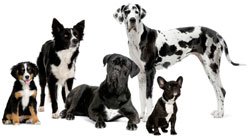 Congratulations, you’ve decided you want a dog. You’ve decided you want to join the 47% of families who enjoy being pup parents. But what type of dog do you get? It’s a question that’s plagued many dog parent and one that will continue to do so. Many people feel that they should look at certain breeds, however, this can be more problematic than one would assume.
Congratulations, you’ve decided you want a dog. You’ve decided you want to join the 47% of families who enjoy being pup parents. But what type of dog do you get? It’s a question that’s plagued many dog parent and one that will continue to do so. Many people feel that they should look at certain breeds, however, this can be more problematic than one would assume.
The truth is, there is no perfect breed for a family, as each dog has his own personal identity. He has likes and dislikes, and each member of a certain breed may act different. Yes, some breeds may be less suited for family life (a working breed such as an Australian Shepherd, for example, is a high-demanding dog with a strong herding drive, and may lash out if not properly worked), but the fact remains: it’s not the breed, but the individual that needs to be judged. Instead of looking at breeds, look into personality types that are suited to your family and their lifestyle.
Continue Reading→


